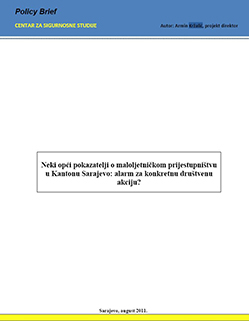
We kindly inform you that, as long as the subject affiliation of our 300.000+ articles is in progress, you might get unsufficient or no results on your third level or second level search. In this case, please broaden your search criteria.

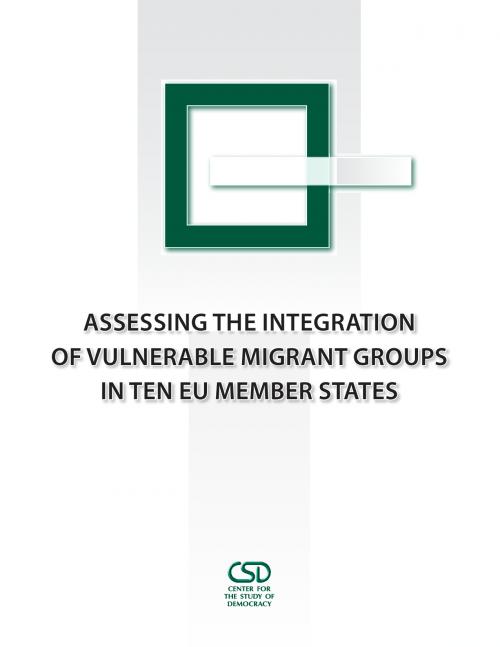
This publication presents the results of a comparative monitoring study of the integration policies and outcomes for third-country-national (TCN) women, TCN children and TCN victims of trafficking in ten EU member states: Austria, Belgium, Bulgaria, Greece, Hungary, Italy, Malta, Poland, Slovakia and Spain. The study produced findings at two levels of analysis: an in-depth assessment of how migrant integration policies and programmes meet the needs of vulnerable migrant groups, and an assessment of their integration outcomes. Drawing on the analysis of these findings, the publication provides recommendations for improving monitoring mechanisms for migrant integration at the national and EU levels and for elaborating policy approaches for better integration of vulnerable migrants.
More...
The phenomena of radicalisation today develop and change at high speed, with their extreme forms manifested globally. The destructive dimensions of (violent) Islamist or right-wing radicalisation have become dramatically visible in Europe posing serious challenges to European societies at large. This report aims to address a knowledge gap with regard to how and to what extent internationally observed radicalisation processes are manifested in Bulgaria. Four different forms of radicalisation are investigated, including Islamist radicalisation, right-wing and left-wing radicalisation, as well as football hooliganism. The report provides policy makers and the expert community with a systematic overview of the main risks to which the Bulgarian society is exposed, as well as of the main actors and ideas, the repertoire of actions and the groups at risk associated with radicalisation. The report outlines recommendations for improvement of the policy and institutional response with regard to radicalisation by way of monitoring and prevention measures as well as multi agency collaboration and community engagement.
More...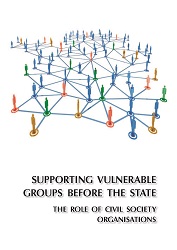
The study analyses the mechanisms for interaction between public institutions and NGOs in supporting four vulnerable groups: persons deprived of their liberty, victims of trafficking in human beings, domestic violence survivors, and persons seeking international protection and other vulnerable foreigner nationals. Furthermore, it identifies trends in the cooperation between institutions and NGOs in assisting these communities. The report sums up the profile of the bodies and organisations involved and identifies problems in their interaction. Instruments for cooperation between public institutions and NGOs in relation to each vulnerable group are reviewed in detail, both on legislative and practical level. Correlations between identified problems and aspects of the interaction between public institutions and NGOs that could help resolve these problems are highlighted. In conclusion, recommendations are made to involve civil society in providing comprehensive support, in particular legal, social and administrative assistance, to vulnerable persons. These recommendations rest on the shared experience and opinions by public authorities and civil society, as well as on applicable foreign models and good practices.
More...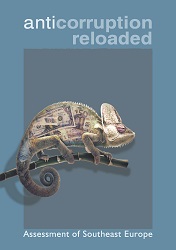
Corruption in Southeast Europe has been in the news, in the focus of public debate, and on the policy agenda of national and international institutions so often and for so long that its scrutiny hardly needs to be justified. It is precisely because it has proven to be such an intractable issue that innovative approaches to its understanding – and hence its reduction – are warranted. The EU accession prospects for the countries in the region – though distant – provide an enabling framework for action but it is local stakeholders, and in particular civil society who can bring about sustained progress in anti-corruption. The Southeast Europe Leadership for Development and Integrity (SELDI) has made the in-depth diagnosing and understanding of corruption and governance gaps in the region one of its main priorities, as a requisite condition for its advocacy of knowledge-driven anticorruption policies. This SELDI report fits in the development and implementation framework of the emerging regional anticorruption policy and infrastructure as exemplified by the SEE2020 Strategy’s Governance Pillar run by the Regional Anti-Corruption Initiative. Despite some important achievements – mostly with respect to the stabilisation of democratic institutions, the adoption of laws in key anticorruption areas, a reduction in petty bribery and growing public intolerance of corruption – anticorruption and good governance reforms are not consolidated, corruption among elected politicians and judges seems to be increasing and the enforcement of anticorruption legislation is haphazard. Anticorruption policies and institutions in the region will benefit immensely from the adoption of regular and accurate victimisation-survey based tool for measuring corruption and the rate of progress in good governance, similar to the special Eurobarometer on anticorruption, UNODC’s SEE monitoring of corruption and organised crime, and the Corruption Monitoring System employed by this report.
More...
Možda ste uvijek sumnjali. Možda je bilo potpuno iznenađenje. Bez obzira na sve, kad se prijatelj/ica, bliska osoba, ili poznanik/ca odluči za coming out i kaže vam da je lezbejka, gej, biseksualna ili transrodna osoba (LGBT), to je uvijek neponovljiv događaj. Za mnoge, spoznaja da je neko koga znamo ili volimo lezbejka, gej, biseksualna ili transrodna osoba budi niz emocija, od zbunjenosti do zabrinutosti, od neugodnosti do počašćenosti. Teško je znati kakva će biti vaša reakcija, da li će vas ostaviti sa puno pitanja, kako razgovarati o tome kako je biti LGBT osoba, šta reći i šta možete uraditi da pružite podršku.
More...
In this paper I will focus on the crisis functioning of the institutions under public and media pressure. Institutions whose function is to provide truth and justice will be discussed: I will look at them in the light of one particular case which sparked incredible public debate in Bulgaria in 2001 and caused a clash between the fi rst (the executive), the third (the judiciary) and the fourth ‘power’ (the media), provoked nationwide outrage, and brought Bulgaria to the brink of a political and institutional crisis in a truly unprecedented way. The focus of my analysis will be the ‘truth discourses’ of these branches of power, and more specifically the critical intertwining of ‘truths’ produced by the Bulgarian executive, media and judicial institutions about the case in question.
More...
A certain number of crimes happened in Bulgaria in the recent years, committed by parents against their own children. What did those crimes have in common? Do they have an analogical mechanism that makes them possible? Why exactly they attracted public interest?
More...
The current report looks at three specific forms of trafficking in persons: child trafficking for begging, for pickpocketing and for sexual exploitation of boys and the way they manifest themselves among Roma communities. The report examines the profiles of victims and discusses the vulnerability factors that make the Roma minority a particular group at risk. The study provides empirical knowledge on the mechanisms of recruitment and exploitation of victims in order to inform identification efforts and counter-trafficking responses. Particular attention is devoted to the policy and measures for assistance of victims. In this field, the report identifies specific gaps in assistance and the way they affect Roma victims in particular, and suggests how child victim assistance could be improved. The active involvement of Roma organisations in the research through participatory methods aimed to gain a deeper understanding of the risk factors involved, bring knowledge back to the communities and support Roma experts’ involvement in counter-trafficking policy and mechanisms.
More...
The aim of the current report is to provide new data and insight on the social and economic effects of public investments in Roma communities from a human development perspective. Its objective is to establish the effects of a wide range of public investments made by Kavarna municipality in the mostly-Roma neighbourhood of Hadji Dimitar, between 2004 and 2014. The investment covered areas such as housing and infrastructure, healthcare, employment, income, poverty and social exclusion, justice and crime, and political participation. It reviews a range of indicators with the aim of establishing the effects of these investments on the social and economic development of the neighbourhood and its residents, both Roma and non-Roma. It also looks beyond the neighbourhood to provide a comparative perspective on a national level. The data presented here is derived from a variety of sources and covers a range of indicators. Every effort has been made to ensure the use of similar indicators and definitions as previous household surveys, notably the UNDP/FRA study, and the NSI, however, the results are not directly comparable due to the difference in survey methodologies, samples and scope. The data presented should be taken as an indication of trends and tendencies. The lack of concrete data on the initial investments, the inputs and relevant baseline indicators has also challenged the quantifying of the contribution of individual public investments. Different investments have had different impact on the development of the neighbourhood and reducing the distances with the Bulgarian residents. This impact has been established by looking at the results obtained from a specialised household survey conducted among 300 Roma and non-Roma households in the Hadji Dimitar quarter of Kavarna in 2015. The relevance and impact of these changes is analysed through comparison with the national averages for the whole population and the averages for Roma nationally. It is also measured against the investments to establish a positive correlation between the effect and the investment where such data exists.
More...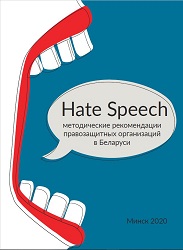
The often-used term of “hate speech” refers to completely different things: individual discriminatory phrases, pictures on social networks or entire journalistic materials. There are more and more differences of opinion on what to consider a "language of enmity" and how to deal with this phenomenon. // These methodological remarks of Belarusian human rights organizations are intended to acquaint a wide range of interested people with approaches to the "language of hostility" from the point of view of international law, to describe the Belarusian legal context, as well as to share important recommendations and references.
More...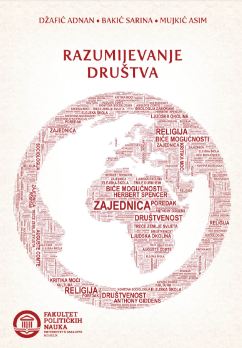
Sociology as the main concern appears in the works included in the book Razumijevanje društva (Understanding of society) which arised as a result of academic teamwork and cooperation. One of the goals for making and publishing this book is to focus on some of the principal areas of sociology in the manner that it will include the scientific and research fields of the authors of the Department of Sociology, Faculty of Political Sciences, University of Sarajevo. The book represents theoretical insights into some of the most important sociological disciplines. In the context of sociological perspectives, the works include the nature and understanding of society, a theory of society with a focus on the approach to sociology as a specific science with its subject and methods. From the point of view of the individual in society, the works are conceived in a way to present the relationship between culture and society, the field of sociology of violence and to give theoretical explanations about society as a system and structure. The third chapter of the book covers three units, namely social inequalities and poverty, society and population, and rural and urban society. Furthermore, the segment of social institutions emphasizes the relations of education, religion and politics and society, as well as the issues of the modern family and tradition. The section on the human environment implies reflections on social changes in general, but also on changes in the modern world, social ecology and research issues of ethnology / social anthropology. The book ends with an article on the development of sociology in Bosnia and Herzegovina. We hope that this book will fulfill its mission of better understanding social reality in both traditional and modern theoretical framework and in that sense will be useful to students of sociology emphasizing the important emancipatory role of sociology.
More...
“This book is not addressed to the learned, or to those who regard a practical problem merely as something to be talked about,” with this sentence English philosopher Bertrand Russell began The Conquest of Happiness and it has become an inspiration for me and a starting point for my analysis. Staying true to Russell's ideas, I have written a book which—I believe—can be addressed to all (scholars as well) who are interested in happiness and how it can be achieved. I have placed my considerations on happiness in the areas we all know: family, marriage, children and gender. When writing the book I surfed through Internet forums and analysed the results of scientific studies in order to scrutinise Russell's seven causes of unhappiness: competition (when investing in children), boredom (of doing housework), fatigue (of double shift), envy and comparisons of mothers, males’ sense of sin, persecution mania and new fathers’ fears of public opinion. Let's be honest: my findings are not always nice. Not infrequently, the results of scientists' work contradict what we believe. Read it only if you are ready to face new and unexpected.
More...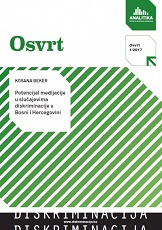
Mediation is a structured procedure, regardless of the name of the procedure, by which two or more parties to a dispute seek to reach an agreement on their own, on a voluntary basis, on resolving the dispute with the help of a mediator. The mediation procedure can be initiated by the parties themselves, it can be proposed or ordered by a court or it can be prescribed by law. Having in mind this definition, it can be concluded that mediation has long been represented as a way of resolving conflicts around the world, because even without special regulations there was no obstacle for one person (mediator) to help other persons in dispute to, peacefully and without engagement of the state apparatus, resolve its dispute in a mutually satisfactory manner. Unlike court proceedings in which one always wins and one always loses, in the mediation procedure both parties will be satisfied with the way the dispute between them is resolved, that is, both parties will win the dispute, because they will have the opportunity to influence the procedure and to reach an agreement that will be acceptable to both parties.
More...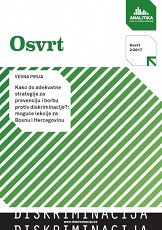
Bosnia and Herzegovina has built a legal framework to combat discrimination in the past. The prohibition of discrimination proclaimed by the constitutions was elaborated in detail by the Law on Prohibition of Discrimination (ZZD), which at the time of its enactment was a progressive legal solution. By adopting the amendments to the CPA during 2016, significant shortcomings related to incompleteness and terminological inconsistency of the grounds and forms of discrimination were eliminated, and the procedural aspects of the procedure for protection against discrimination before the court were improved. // However, discrimination remains an acute problem of BiH society, which is confirmed year by year by relevant reports. Time has shown that the authorities responsible for the implementation of the ZZD do not have the capacity to provide the necessary level of protection to citizens. The competencies and procedures of protection before the Institution of the Human Rights Ombudsman of BiH require fundamental changes, while the case law, despite some progress made in recent years, still "does not follow the significant prevalence of discrimination in BiH society". In addition, the lack of political will to eliminate systemic discrimination established by final court rulings is openly expressed. This situation is discouraging given that declarative constitutional and legal guarantees are not supported by an effective enforcement mechanism.
More...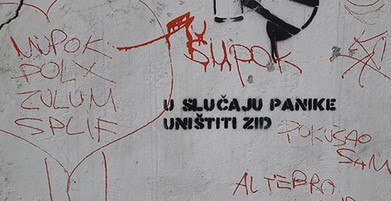
Zapitajte se da li biste uzeli lek koji ste kupili bez recepta kada biste bili 98 odsto sigurni da on deluje? Da li biste se usudili da stavite celu svoju ušteđevinu na jedan broj ruleta ako bi verovatnoća da ćete je izgubiti bila 98 odsto?
More...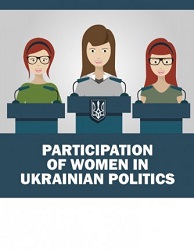
The aim of the research is to carry out the analysis of actions taken by Ukrainian political parties in order to increase the level of women involvement in the policies development and to identify the main challenges at the interparty and cross-party levels. The reforms which are carried out in Ukraine after the Revolution of Dignity offer significant opportunities for the implementation of the best European and international practices in the field of gender equality. In particular,amendments to the electoral legislation pertaining to introduction of gender quotas offer the opportunities for increased involvement of women in political activity. On-going constitutional process makes it possible to incorporate the principles of gender equality in a new draft of the Constitution of Ukraine. The EU-Ukraine Association Agreement envisages implementation of a number of EU directives pertaining to non-discrimination and gendere quality in Ukrainian legislation and daily practice. Administrative reform allows to raise the issue of vertical gender segregation in the state executive bodies. Local government reforms and decentralization process provide anopportunity to promote gender equality mechanism at the level of regions, districts, individual settlements, and amalgamated communities.
More...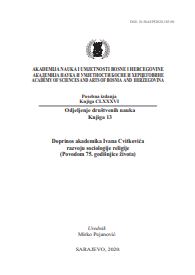
1. Sociolozi o Cvitkovićevom doprinosu sociologiji religije 2. Kritičari o knjigama Ivana Cvitkovića 3. Bibliografija radova
More...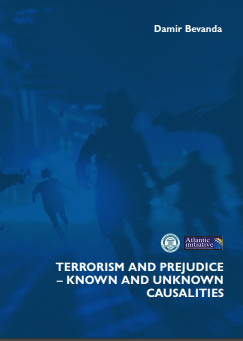
Prejudice based on national, ethnic, racial, religious, class or similar differences that divide people into groups pervade human life. For the most part, human history is marked by conflicts between different groups that often resulted in horrible and mass atrocities because of prejudice. As can be seen from recent history that we witnessed, such conflicts continue and it seems that the intensity of ethnic, religious or other conflicts is not decreasing. Only the means and forms of conflict change. Prejudice has always been the driver of various forms of hostility, ranging from discrimination to war crimes. Terrorism is generally considered the peacetime equivalent of a war crime (Horgan, 2005a). This book is an attempt to answer the question to what extent is prejudice the driving force behind involvement in terrorism. Terrorism became the dominant form of violent political struggle of the weak against the strong in the last century, especially since the 1970s. The legal confrontation with phenomenon of terrorism has been going on an entire century. For half a century, terrorism has been intensively studied in a multidisciplinary manner. And yet, even the first step, defining terrorism, did not yield concrete results in terms of a consensual, generally accepted, unique definition. Phenomenological research on terrorism has offered a number of classifications and typologies that have helped the understanding of terrorism. Etiology has offered a series of theories about the causes of terrorism that have been accepted, re-examined, rejected, upgraded, changed, etc. The concept of radicalisation has changed the ways of understanding the individual becoming a terrorist. The question of why someone becomes a terrorist has been transformed into the question of how someone becomes a terrorist. Among the numerous theories about the causes of terrorism, the impact of prejudice against certain groups has not been established or investigated so far. Therefore, it constitutes an unexplored causality. On the other hand, the cause-and-effect connection between terrorism and the growth of prejudice has been repeatedly investigated and empirically proven, in such a way that a terrorist act leads to an increase in prejudice against the actual or perceived ethnic, religious, etc. group of the terrorist. In general, terrorism research is marked by a lack of empirical data. For years, terrorism researchers and security experts have lamented the lack of primary data to understand terrorism (Braddock, 2019). Despite these complaints, most terrorism researchers have not presented primary data, used the rigorous scientific methods of the social sciences, or the benefits of statistical analysis. Sageman (2008) spoke critically about the scientific challenges of researching terrorism, stating that science is not a set of beliefs but a methodological procedure that tests hypotheses. In this sense, a large number of authors researching terrorism have concentrated on the cases of Osama bin Laden, the first attack on the World Trade Center in 1993 or the terrorist act in Bali in 2002. Researchers have erred in making generalisations based on individual cases. Other authors have used selective information, selecting facts that support their arguments while ignoring facts that contradict them.
More...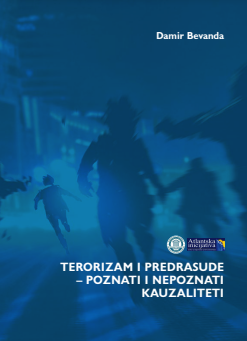
Predrasudni stavovi temeljeni na nacionalnim, etničkim, rasnim, religijskim, klasnim i sličnim razlikama po kojima se ljudi razdvajaju u skupine prožimaju društveni život ljudi. Ljudska povijest u većem dijelu obilježena je kon*iktima između različitih skupina koji su nerijetko rezultirali užasnim i masovnim pokoljima upravo zbog predrasuda. Kako se vidi iz bliže povijesti, čiji smo svjedoci, ovakvi sukobi se nastavljaju i čini se kako intenzitet etničkih, religijskih i sl. sukoba ne opada. Mijenjaju se samo sredstva i oblici sukoba. Predrasude su oduvijek bile pokretač različitih oblika ispoljavanja neprijateljstava, od diskriminacije do ratnih zločina. Terorizam se općenito smatra ekvivalentom ratnog zločina u vrijeme mira (Horgan, 2005a). U kolikoj mjeri su predrasude pokretač uključivanja u terorizam nastojimo odgovoriti u ovoj knjizi.1 Terorizam postaje dominantan način nasilnog vođenja političke borbe slabijih protiv jačih u prošlom stoljeću, naročito od 70-ih godina. Pravno sučeljavanje s fenomenom terorizma traje cijelo stoljeće. Pola stoljeća terorizam se intenzivno multidisciplinarno proučava. Pa ipak, već prva stepenica, definiranje terorizma, nije dala konkretne rezultate u smislu koncenzualne, općeprihvaćene, jedinstvene definicije. Fenomenološko istraživanje terorizma je ponudilo niz klasifikacija i tipologija koje su pomogle razumijevanju terorizma. Etiologija je ponudila niz teorija o uzrocima terorizma koje su prihvaćene, preispitivane, odbacivane, nadograđivane, mijenjane itd. Koncept radikalizacije je promijenio načine shvaćanja individualnog postajanja teroristom. Pitanje zašto netko postaje terorist transformirano je u pitanje kako netko postaje teroristom. U mnoštvu teorija o uzrocima terorizma do sada nije postavljen niti istraživan utjecaj predrasuda prema određenim skupinama. Dakle, radi se o neistraženom kauzalitetu. S druge strane, višestruko je istražena i empirijski dokazana uzročno-posljedična povezanost terorizma s rastom predrasuda, na način da izvršeno terorističko djelo dovodi do porasta predrasuda prema etničkoj, vjerskoj i dr. skupini iz koje napadač-terorist dolazi ili koju se percipira takvom.
More...